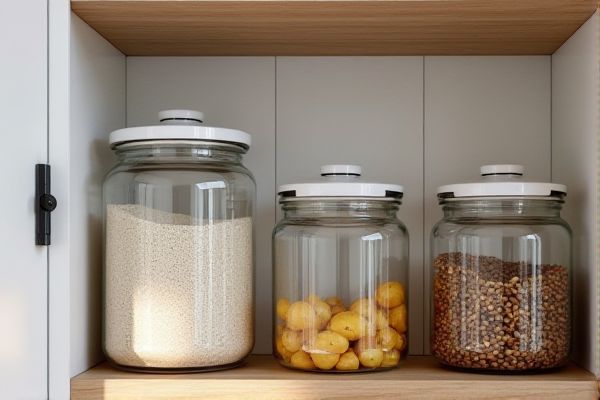
Glass canisters offer superior airtight sealing and prevent odor absorption, making them ideal for preserving the freshness of pantry items compared to plastic canisters, which may retain stains and odors over time. Explore the rest of the article to discover which pantry storage solution best suits your needs.
Table of Comparison
| Feature | Glass Canisters | Plastic Canisters |
|---|---|---|
| Material | Tempered or borosilicate glass | Food-grade plastic (usually BPA-free) |
| Durability | Fragile, prone to breaking if dropped | Impact-resistant, less prone to damage |
| Food Safety | Non-reactive, chemical-free | May absorb odors and stains, potential chemical leaching (if low-quality) |
| Transparency | Crystal clear, easy content visibility | Varies; some clear, some opaque |
| Weight | Heavier, less portable | Lightweight, easy to move |
| Environmental Impact | Recyclable, eco-friendly, reusable | Less eco-friendly, some recyclable types |
| Seal Quality | Often airtight with silicone or rubber seals | Airtight seals vary by design and brand |
| Price | Higher upfront cost | Generally more affordable |
Glass Canisters vs Plastic Canisters: An Overview
Glass canisters offer superior durability and non-reactive properties, preserving food freshness without leaching chemicals, unlike plastic canisters which may degrade over time and release harmful substances. Glass is eco-friendly and fully recyclable, reducing environmental impact compared to single-use or less sustainable plastic counterparts. Transparency and airtight seals in glass canisters enhance visibility and maintain pantry organization, whereas plastic canisters often suffer from staining and odor retention.
Durability and Longevity Comparison
Glass canisters offer superior durability and longevity due to their resistance to scratches, stains, and odors, maintaining clarity and hygienic storage over time. Plastic canisters are more prone to wear and tear, including warping, discoloration, and absorbing odors, which can compromise food quality and container lifespan. Investing in glass pantry canisters ensures a sustainable, long-lasting storage solution that withstands frequent use and cleaning.
Safety and Health Considerations
Glass canisters offer superior safety and health benefits compared to plastic canisters, as they are non-toxic, BPA-free, and do not leach harmful chemicals into food, even when exposed to heat or sunlight. Plastic canisters, especially those made from low-quality materials, may release endocrine disruptors like BPA and phthalates, posing potential health risks over time. Glass is also more resistant to staining and odor retention, ensuring a cleaner and safer storage environment for pantry items.
Impact on Food Freshness and Flavor
Glass canisters provide an airtight seal that significantly preserves food freshness and maintains flavor integrity by preventing moisture and air infiltration. Unlike plastic canisters, glass does not absorb odors or stains, ensuring the original taste of pantry items remains unaltered. The non-porous nature of glass also inhibits bacterial growth, extending the shelf life of stored foods compared to plastic alternatives.
Ease of Cleaning and Maintenance
Glass canisters offer superior ease of cleaning due to their non-porous surface, preventing stain and odor retention commonly found in plastic canisters. They are dishwasher-safe and resistant to scratches, ensuring long-term hygiene and aesthetic appeal. Plastic canisters often absorb oils and odors, requiring more frequent and thorough cleaning to maintain freshness in pantry storage.
Aesthetic Appeal and Pantry Organization
Glass canisters offer a sleek, transparent aesthetic that enhances pantry organization by making contents easily visible, promoting a clean and uniform look. Their sturdy, non-porous surface resists stains and odors, maintaining a fresh pantry environment, while plastic canisters often lack the same clarity and can become scratched or discolored over time. Choosing glass canisters not only elevates the visual appeal of Your pantry but also simplifies identifying ingredients quickly, optimizing your storage efficiency.
Eco-Friendliness and Sustainability
Glass canisters are highly eco-friendly due to their recyclability and long lifespan, reducing waste and lowering environmental impact. Unlike plastic canisters, which contribute to microplastic pollution and are often single-use or less durable, glass containers avoid harmful chemical leaching and can be reused indefinitely. Choosing glass supports sustainability by minimizing reliance on fossil fuels and promoting a circular economy in pantry storage solutions.
Cost and Value for Money
Glass canisters typically have a higher upfront cost compared to plastic canisters but offer superior durability and better preservation of food quality, providing greater long-term value for money. Plastic canisters are generally cheaper and lighter but may degrade over time, potentially leading to more frequent replacements and higher costs in the long run. Your choice depends on weighing initial expenses against durability and maintaining food freshness in your pantry.
Weight, Handling, and Practicality
Glass canisters are heavier and more fragile than plastic canisters, requiring careful handling to avoid breakage, while plastic options are lightweight and more durable, making them easier to maneuver in a busy pantry. Glass offers better durability against stains and odors and maintains food freshness longer due to its non-porous nature, enhancing practicality for long-term storage. Your choice depends on whether you prioritize durability and weight convenience or superior food preservation and aesthetic appeal in pantry organization.
Best Uses for Glass and Plastic Canisters
Glass canisters are ideal for storing dry goods like coffee, sugar, and spices since they provide an airtight seal that preserves freshness and resist odors and stains. Plastic canisters work well for lightweight and bulk items such as cereal, pasta, and snacks due to their durability and shatter-resistant nature. Choosing the right material for your pantry depends on the specific storage needs, with glass offering superior protection for aromatic and moisture-sensitive foods, while plastic provides convenience and impact resistance.
 homyna.com
homyna.com